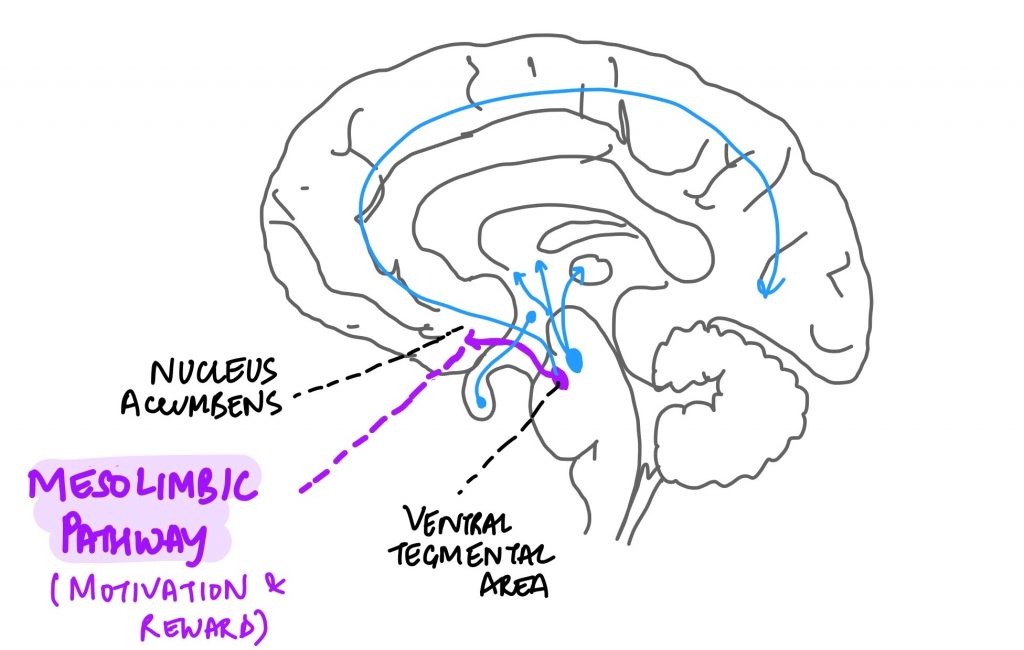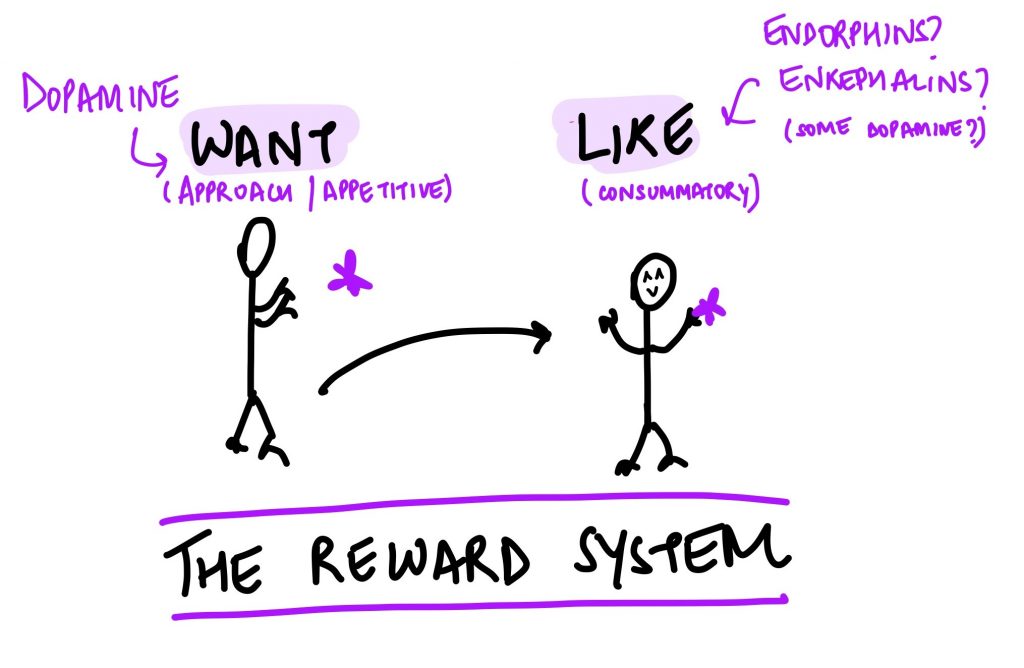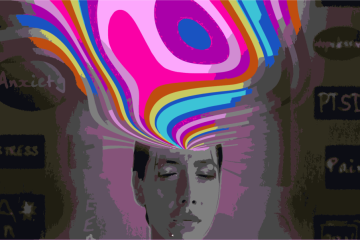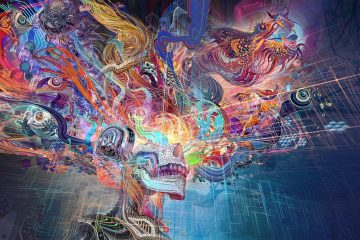If you’ve ever scrolled through health and wellness content on social media, you HAVE heard about dopamine, the supposed ‘reward’ or ‘pleasure’ chemical of the brain. You must have also heard about practising dopamine detox. Right off the bat, dopamine detoxes are NOT what you think, and they do NOT work the way you’re lead to believe at all.
In fact, dopamine isn’t even fully responsible for pleasure.
Here’s a very, very interesting study to illustrate this, before I formally explain the real deal with dopamine and pleasure/reward. Just bear with me as I explain some (super important) science jargon that lays foundation for this experiment.
Dopamine is a neurotransmitter (i.e., a chemical released in the brain and mediating communication between brain cells), that is primarily released from 2 areas of the midbran, one of which, the ventral tegmental area, is the one we’re interested in. It stimulates a part of the brain called the nucleus accumbens, and this system together comprises the mesolimbic pathway for reward-motivated behaviour. This means it is responsible for driving/motivating us to seek pleasure.

Okay, so this study took some mice, and severed the mesolimbic pathway, so they no longer had the dopaminergic reward stimulus for pretty much anything, which included eating food.
As observed, the mice simply didn’t bother to eat food, to the extent that they would starve to death. That is how freaking important the reward pathway is- it drives us to perform even tasks that are necessary for survival!
But here’s something ever more interesting. When food was kept in the mice’s mouth, they would readily eat it, and also like it/ receive pleasure from it (observed by behavior like lip-smacking in mice). So, the mice had retained the ability to like food; they just didn’t want food.
This study gives us a crucial understanding of the reward pathway – there’s 2 limbs to it.
Firstly, there’s the ‘wanting behavior’, termed the appetitive or approach behavior, wherein an individual is motivated/attracted to something they perceive will be pleasurable.
The second limb is the ‘liking behavior’, called the consummatory behavior, wherein, an individual experiences pleasure on completing the desired task.

Only the appetitive (wanting) behavior is mediated by dopamine, not pleasure itself. As seen in the mice, cutting the dopamine pathway made them unmotivated to look for food, but didn’t take away their experience of pleasure on tasting food. Other chemicals, like endorphins (body’s natural opioids), serotonin and oxytocin are more significantly involved in eliciting the feeling of pleasure.
So just to drive home the message, dopamine drives us to seek pleasure, it does not itself cause pleasure.
Why is this distinction important? Because it helps us understand why dopamine detoxes are a myth – because you can never truly detox from dopamine. Dopamine release is not a result of your actions, it’s causing those actions.
Another way to understand it is this-you can not get addicted to dopamine.
Take drug addicts, who abuse drugs like cocaine, heroine, and morphine. All these drugs cause different psychosomatic effects on the individual. They all also stimulate dopamine release from the mesolimbic pathway that causes drug addiction. But while dopamine makes you learn behavior to seek the substance again, it isn’t itself causing that feeling of euphoria you get from the drugs. That feeling is attributed to the drug itself.
Dopamine functions as a motivator and a memory creator. Remembering what made you feel good, and how to get it again is the job of dopamine.
In drug addicts, ‘wanting’ and ‘liking’ are dissociated, such that the desire to use the drug increases, but the pleasure received from the act gradually decreases, owing to drug tolerance. Hence, they need even larger amounts of the drug to elicit the same pleasure response as before.
The conversation on drug addiction ties neatly into the next point I want to make, something that I learnt from Dr Bruce D Perry, while reading his latest book ‘What Happened to You’ (co-authored with Oprah). He calls it the ‘Daily Reward Bucket’.
The idea is that acts of reward/pleasure are essential to living a fulfilling life, but the feeling is super short-lived, so we need regular doses of ‘feeling good’. Hence, the idea of like a daily minimum amount of reward every individual needs.
Imagine you need to fill a bucket every day with moments that make you feel good.
There are a number of things that can trigger the reward pathway and fill this daily quota, some being inherently healthier than others. These include-
- Sweet, salty, fatty foods
- Relations (volunteer work, spending time with loved ones, helping others etc)
- Regulation of rhythm, such as that generated by deep breathing
- Physical touch, and sex
- Exercise
- Drugs/alcohol
- Likes, comments on social media
- Getting your pay-check (hence addiction to gambling)
You can use one or more means of getting your daily reward dose. According to Dr Perry, relations, by virtue of us being a social species, are the strongest way of experiencing pleasure.
Moreover, people who do not have the healthier means of fulfilment gravitate towards the unhealthier, more addictive means such as substance abuse, porn addiction, binge-eating etc.
In fact, Dr Perry says “for people who are well-regulated with healthy forms of reward, pull to use drugs again and again is not as powerful”. They might feel pleasure using once, but they’re less likely to get addicted.
Something I find super fascinating is the fact that relief from distress gives pleasure. For me, every time a morning 8-9 AM lecture does not take place, even if I have already reached the class on time, I get a small kick. That’s on a very small level. For people who are struggling to make ends meet, who are running to one deadline after another, who are working in toxic environments, every breath of fresh air from their misery gives them a massive sense of pleasure.
But back to the micro-level, I feel, the reason we get pleasure from cancelled work is because the work was distressing for us in the first place. And therein lies the idea of ‘making your why stronger’, because whether your mesolimbic pathway decides on doing or abandoning the task in that moment depends on whether the reward of doing that thing is more compelling for you than the instant gratification of giving it up.
References-
- https://en.wikipedia.org/wiki/Dopamine
- What Happened to You by Dr Bruce D Perry and Oprah Winfrey
- https://www.brainfacts.org/thinking-sensing-and-behaving/learning-and-memory/2018/motivation-why-you-do-the-things-you-do-082818#:~:text=Neurons%20that%20release%20dopamine%20are,and%20memory%20center%2C%20the%20hippocampus.
- https://www.ncbi.nlm.nih.gov/pmc/articles/PMC2958859/
- https://www.simplypsychology.org/brain-reward-system.html#:~:text=The%20most%20important%20reward%20pathway,accumbens%20via%20the%20mesolimbic%20pathway.
- https://www.theverge.com/2018/3/27/17169446/dopamine-pleasure-chemical-neuroscience-reward-motivation
- https://www.health.harvard.edu/blog/dopamine-fasting-misunderstanding-science-spawns-a-maladaptive-fad-2020022618917
- https://psyche.co/ideas/the-fascinating-science-of-pleasure-goes-way-beyond-dopamine



9 Comments
Adwait · October 13, 2022 at 11:09 am
This was a great read 🙂 Thank you so much for the article Ma’am.
Mridula · October 24, 2022 at 11:04 pm
Glad you enjoyed! 😀
Shadab Quraishi · November 9, 2022 at 7:55 pm
I appreciate your work…amazing knowledgeful article
Mridula · November 26, 2022 at 6:23 pm
Thanks a lot
Bismill · November 11, 2022 at 10:14 pm
“”relieve from distress gives pleasure””(best line)
I think this is why we repeat the same mistakes again and again until our circumstances doesn’t change.
Our unwanted lives force us to get some pleasure.
Thank you for the Article miss Garg
Mridula · November 26, 2022 at 6:23 pm
Absolutely
Thanks!
Karan · February 2, 2023 at 8:09 am
Really well written with some great insights.
Mridula · February 2, 2023 at 9:03 am
Thanks so much!
Why?? – Mridula Garg · May 14, 2023 at 11:56 pm
[…] this is well-studied neural circuitry. I have talked about dopamine on this platform before (read here) – it is the chemical responsible for our motivation to act the way we do, to pursue the […]